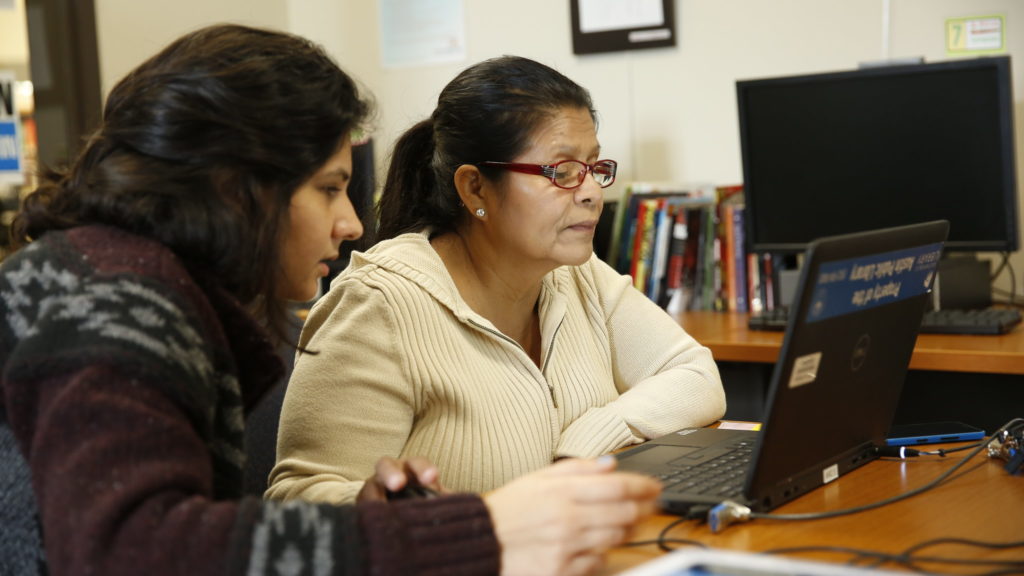
Victoria’s public libraries play a key role as intermediaries between government departments and community members without the digital literacy required to navigate online services, particularly seniors and people who speak languages other than English. In research conducted recently by Public Libraries Victoria, libraries across the state report that, since the phasing out of paper forms, assisting people to fill in forms for all kinds of government-related services ‘has become part of our bread and butter offerings’.
In one regional library branch alone, an estimated 50 people per week ask for help to navigate online services.
Libraries routinely offer one-to-one support to use computers on site. But providing assistance to navigate online services is complex. As one rural library manager pointed out, ‘We have an ageing demographic and many have no digital literacy at all, so it is far from a solution to just provide them access to a computer.’
Another library staff member in a busy metro service notes, ‘when seniors require assistance with technology, it is not just a matter of needing technology support, but also emotional support. Many of the seniors our staff work with lack confidence in their ability to learn about a new device or new technology generally. This can create anxiety and is often a greater obstacle to their digital literacy [than access to technology]. It also means that we can’t solve their issue by simply pointing our customers to a particular website… [W]e need library staff who have time and patience for these one-on-one sessions with seniors.’
Libraries assist in online form filling across a spectrum of services, including Centrelink, Medicare, VicRoads, myGov, job applications, visa and passport applications and renewals, lease agreements, police checks, working with children checks (notably for volunteering), seniors card, health forms, citizenship applications, immigration forms, building permits, tax help, solar grant applications, scanning documents to email to third parties (e.g. lawyers, financial services), and more. In light of the COVID-19 pandemic, they continue to be instrumental in assisting communities to apply for and print out permits to cross state borders.
People are referred to libraries by the police, post office and Centrelink staff for this kind of assistance. Job centre agencies frequently send people to libraries for assistance with applying for jobs; although the agencies get paid for the people on their books, they do not provide computer access or assistance with job applications. Some rural and regional libraries function as Customer Service Centres for Councils, routinely assisting senior community members to complete Council forms online.
Libraries offer assistance face-to-face through a mix of drop-in and by-appointment services. During the COVID-19 lockdown, they provided support by phone, email and/or via Facebook chat, and many continue to do so, in addition to providing face-to-face support. The support required can be very hands-on. As a rural library manager noted, ‘Many of these [applicants] are seniors and do not have their own email addresses set up and require quite intensive assistance from staff to be able to complete the online requirements for the various agencies.’ Similarly, a staff member in an interface council library says, ‘Often staff need to sit with individuals to explain what the online form is asking them for, help them to navigate to and through such forms, [and] help get an email address so that they interact with these forms to begin with.’
Examples
A staff member remembers an elderly couple spending half a day renewing their passports for a trip to the UK, near the end of 2019. Whether you apply online or using a paper form, you also need an email address. ‘They were here for hours by the time we helped them both to get email addresses and then use them to work through the [online] passport form. The gentleman was fond of using reptile names for his passwords.’
A 77-year-old patron of one interface council library service uses the library to file intervention orders and victims of crime statements.
A senior patron at another interface council library branch was pleased to discover she could deal with Centrelink online, no longer requiring her to visit the office and pay for parking.
Library staff are keenly aware of privacy issues raised by the hands-on level of support that they are often asked to provide, particularly when operating in shared spaces. Says a rural library manager, ‘The trend towards digital forms across the board represents increasing pressure for staff, as navigating websites, accounts and private information is a minefield.’ Similarly, a manager in an interface council library says, ‘The issue for library staff is always one of trying to help people whilst maintaining privacy.’ Privacy concerns are particularly acute in small towns.
Library guidelines on levels of assistance vary, with some discouraging staff from inputting data directly into forms and/or insisting that patrons accept terms and conditions and click submit buttons. Staff may remind patrons of the privacy act and explain that they can only assist so far. In other cases, patrons rely on librarians for hands-on support. As a regional library manager says, ‘Library staff are trusted. We are dealing with such private information and yet our patrons have the utmost trust in us and are so grateful as we are generally the only ones that can assist.’
The COVID-19 pandemic adds the challenge of managing social distancing while providing support.
Libraries also offer basic computer courses, one-to-one technical support (‘help desk’) to help people navigate their own devices, and information sessions on services such as MyGov. An increasing number of library services are exploring device lending schemes such as Be Connected and the Good Things Foundation, coupled with digital skills building classes, conscious that the COVID-19 pandemic has heightened how important it is to bridge the digital divide, particularly for seniors.
